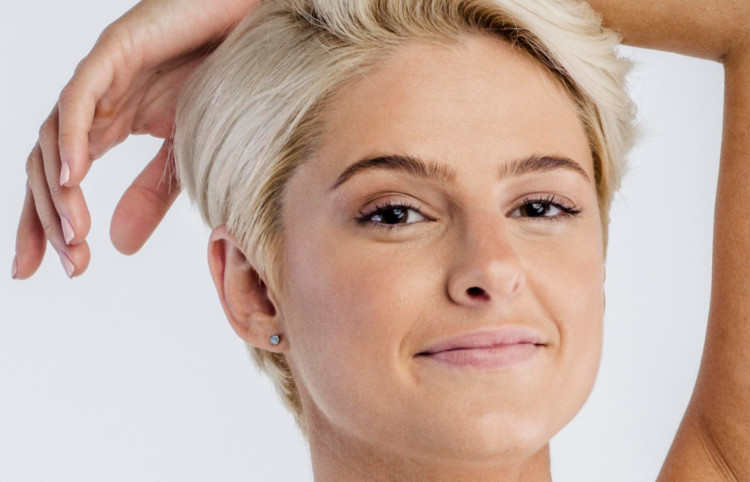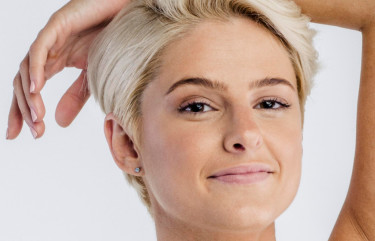AviClear: What You Need to Know
Pros & cons
Costs and insurance
How it works
What to expect
How soon you see results
If it's permanent
Safety and side effects
Fast facts
AviClear is the first FDA-cleared laser energy device design for the treatment of mild to severe acne vulgaris. This new acne treatment option has been shown to improve existing acne for clearer skin, while making future breakouts shorter, less intense, and less frequent.
“For the first time in 40 years (since 1982 when Accutane was released), we have a new treatment to combat acne,” says Dr. Elise Grenier, a board-certified physician in San Francisco. Her practice has been an early adopter of the treatment, and she has been especially impressed with how well AviClear treats severe acne. “The worse your acne is, the better this treatment works,” Dr. Grenier notes.
Excess sebum (an oily substance) can collect dead skin cells and debris, forming a sticky plug that clogs pores. This gives rise to all types of blemishes, including blackheads and whiteheads. Bacteria living in the sebaceous glands feed on this excess sebum, which can inflame pores to the point of rupture and create acne pustules, papules, nodules, and cysts.
AviClear works by selectively targeting and heating the skin’s sebaceous glands with a 1726 nanometer wavelength laser, to destroy the glands’ sebum production. “The glands will grow back. However, they are down regulated and do not produce as much sebum after treatment,” explains Dr. Grenier.
Manufactured by Cutera, the AviClear laser is precise to the point that the laser energy damages the sebaceous glands only, while sparing surrounding structures. It also has a built-in cooling function to lower the skin’s temperature and make the treatment more tolerable. “This special cooling function also allows for all skin tones to be treated, without worrying about post-inflammatory hyperpigmentation (PIH),” Dr. Grenier notes.
The standard protocol involves three monthly AviClear treatment sessions, but your treatment plan will depend on the severity of your acne and your skin type. Each 30-minute treatment session comes with little to no downtime.
Pros
- This FDA-cleared laser treats active acne and helps prevent future breakouts by suppressing the oil glands responsible for sebum overproduction.
- AviClear laser treatments have been shown in clinical trials to improve all acne types and severities, for patients of all ages and skin tones.
- While it’s primarily an acne treatment, this laser also reduces pore size and fine lines.
- The device’s contact-cooling technology, AviCool, makes AviClear laser acne treatments relatively painless. Patients compare the sensation to a rubber band snapping sensation. In the clinical trial, all subjects tolerated the treatment without topical anesthetic.
- It’s a quick treatment, requiring 30-minute sessions.
- There’s little to no downtime with the AviClear laser; you can return to your normal activities afterward.
- It’s an effective alternative to treatment options like isotretinoin (Accutane), which can come with more serious side effects, require close monitoring of blood work, and cause birth defects.
- Results are long-lasting. Study subjects experienced clear skin for up to two years after a treatment series.
- Patient satisfaction is high: 9 out of 10 clinical trial participants say they were “satisfied” or “very satisfied” with the improvement in their skin, and it has a high Worth It Rating from patient reviewers on RealSelf.
- It effectively treats active acne and prevents new breakouts, which can reduce acne scars.
- AviClear is also cleared in Canada to treat acne scars.
Cons
- As an in-office laser procedure, AviClear costs significantly more than at-home acne remedies, including prescription medications.
- Because this new treatment option is still considered “experimental,” AviClear is not yet covered by insurance.
- You’ll need a series of three treatments for best results, as well as occasional follow-up treatments down the road to maintain your results.
- Some patients experience acne flare-ups after or in between treatment sessions. “Flare-ups can be reduced with over the counter antihistamines,” according to Dr. Grenier. Ask your provider how best to manage any flare-ups you may experience.
RealSelf Tip: So far, AviClear has only been FDA-cleared to treat the face, but some providers may use it off-label to treat other acne-prone areas. Ask your provider what they recommend.
- Average Cost:
- $3,000
- Range:
- $2,100 - $4,000
Your AviClear cost will depend on your provider’s credentials and level of experience, their practice location, how many treatments you need, and the size and number of treated areas.
AviClear is not covered by insurance. Despite its positive clinical trial results and FDA clearance, it’s new enough that it’s still considered an experimental treatment option. That should change as its reputation becomes more established. In the meantime, most practices offer monthly payment plans or accept third-party financing options, to help make it more widely affordable to patients.
The AviClear photos in our gallery have been shared by the provider who performed the procedure, with the patient's consent. (Results may vary.)
AviClear laser has a 85% Worth It Rating from reviewers on RealSelf, with many raving that this acne treatment worked for them when other options (including the oral medication Accutane) had failed.
Patient satisfaction was similarly high in a company-funded study of 104 patients with moderate to severe acne. Following a series of three treatment sessions:
- 80% of patients treated with AviClear saw at least half of their acne lesions resolve within three months.
- 87% of patients saw at least half of their acne clear at six months.
- 92% of patients saw at least half of their acne clear at 12 months.
At six months out, patients with moderate and severe acne saw, on average, a 93% reduction in deep nodules, which are ordinarily very difficult to treat. Future acne breakouts were shorter, with fewer and more minor lesions.
There were no significant side effects or adverse events noted in the clinical studies.
Each year, approximately 50 million teens and young adults across North America seek medical treatment for acne. Roughly half continue to struggle with breakouts into adulthood. Nearly all of these people are good candidates for AviClear.
“It can be used across all skin types,” notes Dr. Joshua Zeichner, a board-certified dermatologist in New York City. “It’s a great option for people who are resistant to or not candidates for traditional [acne] medications.”
While AviClear can improve all types of acne—from mild to severe, both comedonal forms (blackheads and whiteheads) and inflammatory bumps—“the most dramatic results are apparent in patients who start off worse to begin with,” adds Dr. Zeichner.
Dr. Emmy Graber, a board-certified dermatologist in Boston, has been especially impressed with AviClear’s ability to treat cystic acne nodules, which historically haven’t responded well to laser therapy. “In the past, we would’ve needed to use something like oral isotretinoin [Accutane] or antibiotics for nodules,” she says.
Like most lasers, AviClear is contraindicated in pregnancy, but Dr. Graber has had a number of patients book the treatment in anticipation of getting pregnant, to help their skin stay clear while they’re expecting. “It’s an awesome option for those patients, because we don’t really have much to offer pregnant patients with acne,” she says.
It may worsen certain types of rosacea—the flushing type, in particular—so it’s important for providers to accurately distinguish between acne and rosacea, and to target only the former with AviClear.
Here’s how to prepare for your AviClear laser treatment:
- It’s recommended that patients take an antihistamine like Zyrtec or Allegra 3 days prior and for 7 days afterward, says Dr. Grenier. This decreases the possibility of breakouts (aka purges) between treatment sessions.
- If you use a topical retinoid regularly, discontinue it for a couple of days prior to your AviClear treatment. (This will help you avoid the day-long redness that could otherwise be triggered by the pre-treatment acetone wipe.)
- Men should shave the morning of treatment, if hair-bearing areas are being treated.
Once you arrive for your appointment, here’s what to expect.
- No numbing cream is applied, as it can increase the risk of complications. The laser targets oil, and topical anesthetics typically contain oil, which is difficult to fully wipe away. It’s safest to use the laser on clean, oil-free skin.
- Your face will be cleansed, and your provider will degrease the treatment area with an acetone wipe.
- Your provider will lay wet gauze pads over your whole face. “Wetting the skin helps with the laser’s contact-cooling mechanism, ensuring there’s even cooling dispersed throughout the entire treatment area,” explains Dr. Graber.
- The gauze is removed, section by section, just prior to the laser’s pass.
- Some parts of the face may need only one pass, while problem areas may require two. Certain sections of the face, like the upper lip and forehead, tend to be more sensitive to the laser than others.
- After applying sunscreen immediately post-treatment, you’ll be good to go.
Your face may look a bit inflamed and swollen immediately afterward, but this should resolve in 1-4 hours, says Dr. Grenier.
Most patients see full results within six months of their final treatment, though some see a significant improvement in as little as three to four weeks.
Outcomes are variable and differ from one patient to the next. “We do three treatments on everyone,” says Dr. Graber. “Most of my patients find they’re somewhat better after the second treatment. Some look great and are very happy after the first. For others, it’s not until after the third round that they really notice an improvement.”
AviClear laser results are not permanent. However, the FDA has recognized this as a long-term treatment for acne, and results have been shown to last at least two years. The benefits may last longer than that for some patients, though you should expect to need maintenance treatments in the future to keep up your results.
Researchers saw no significant side effects in the clinical trial. They found AviClear to be safe, effective, and well tolerated by all skin types, including olive, brown, and deep skin tones, which are traditionally more prone to laser-related complications.
There were no reported cases of hyperpigmentation in the study, and trial subjects gave the treatment an average score of 5.1 on the discomfort scale (again, no anesthetic was used during the procedure).
According to the manufacturer, your skin may look inflamed and slightly swollen for up to two days following treatment, though Dr. Graber tells us that most of her patients see redness fade before they even leave her office.
Some people experience breakouts after their AviClear treatment—due to a purging effect—but they typically resolve within a few days. As we mentioned above, taking an over-the-counter antihistamine for 3 days before and 7 days after your treatment will reduce these breakouts.
Updated October 20, 2023

